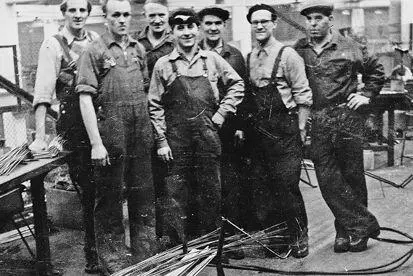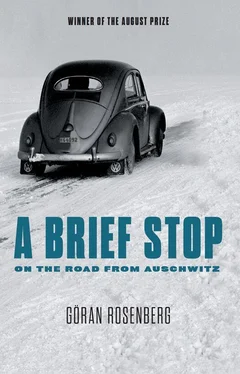One day you come home with an eight-branched candlestick made of curved, welded brass pipes. A ninth branch is welded at an angle to the rest, to hold the candle used to light the other candles. You’ve made the candleholders out of six-sided brass nuts. I remember the candlestick as well as I remember the Christmas tree, a small one for tabletop use, that I nag you into buying at an early stage. A full-length tree is out of the question, even if everybody else has one. I know that we don’t celebrate Christmas and that the candlestick is a sort of compromise. It’s a Jewish candlestick, a Hanukkah candlestick, and the eight candles are lit from the ninth, one evening at a time, to commemorate an event in the Jewish calendar that coincides well enough with the season of Christmas tree lights and orange advent stars for one set of lights to be equated with the other. And then there are the Lucia candles, which somehow belong to us all. The Lucia Day celebration is a festival everybody at the big truck factory participates in, with hundreds of employees and their families sitting in the huge assembly shop at long tables set with festive ginger biscuits, and the children fishing with long rods over blue fabric screens to pull out bags of presents. The Lucia celebration is my only close contact with the big truck factory, but the sensation of oil, metal, and soot persists in my nostrils and the sparkle of Lucia candles shines in my memory. The intention of the Lucia celebration is to build “bridges between management and employees and between the shop floor and administrative staff,” and to strengthen something called the Scania Spirit. To strengthen the Scania Spirit, the employees are also offered subsidized study circles and holiday cottages and loans to build their own homes, and they’re given gold pins or gold watches for long and loyal service. There are no two ways about it: the big truck factory is doing all it can to give its employees no cause to dream of a future other than the one already on offer. Benefits for the workers, rewards for the loyal, promotion for the ambitious.
It’s a bright time, in short. A time for bright dreams and big projects.
Your Project is to start life anew in the town with the big truck factory. I’d like to see the town as the given place to do it in, since it’s the place that’s given to me, but one of the reasons you get off the train in Södertälje Södra, apart from your qualifications as an experienced truck builder for Firma Büssing in Braunschweig, is that you’re not permitted to get off the train in Stockholm. Nor are you permitted to get off the train in Gothenburg or Malmö. On the series of six-month work and residence permits issued to you from March 1946 to January 1952, those are the stipulated exceptions: not valid for residence in Greater Stockholm, Gothenburg, or Malmö. Once or twice we go to Stockholm on the train that crosses the bridge over the canal and I chant the names of the stations along the line, but for some reason you have no right to live and work there. Nor does Mom.
Perhaps it’s just as well. In the forbidden books at Per Olof’s, I read nothing but dark things about the morass of the big city, and in the little town with the big truck factory the future looks bright even to foreigners who have just stepped off the train. After work, you stay up late into the evening with your head bowed over the booklets and exercise books of your correspondence courses, since you have no intention of remaining a pipe fitter forever.
Correspondence courses are the Place’s dream factory. With the help of correspondence courses, anybody in any small town can become anything. You want to become a mechanical engineer, and on the small round table in the living room lies a thick book with a red binding and the title Forge and Machine Work . It begins: “Every individual benefits from being able to do calculations.” Hereafter follow calculations galore, thousands of pages filled with detailed, illustrated instructions in the method and technique of handling all the machines of the modern engineering industry: automatic lathe and turret lathe operation, pressure turning, arc welding, spot welding, seam welding, welded pipe bends. The book is recommended by representatives of every interest group and social class in the Swedish dream factory, the trade unions, the employers, the engineers, and the professors, and claims to provide “precisely the modern, practical instructions required for today’s accelerated pace of production.”
There’s a photograph of you at the factory, surrounded by your workmates in the pipe gang. It’s taken in 1951. You’re standing in the front with your welding goggles flipped up; you’ve taken off your peaked cap, and you’re smiling as if you’ve just completed a perfect weld and know your own worth as a pipe fitter. The others in the picture are wearing caps or berets and look more impassive. I recognize one of them from the world outside the factory, perhaps from the sand at the beach, but the factory is part of your world, not mine. You vanish in there for forty-eight hours a week, including Saturdays, and exactly where it is that you go once you’re inside the factory gate beyond the viaduct, I don’t know. The factory’s bigger than the rowanberry avenue, in fact bigger than the little town itself. The town has other factories besides, one of which swallows up your Haluś in the mornings, and sometimes in the evenings, to speed-pack tablets in bottles, or sit by a conveyor belt sewing clothes to music, and you’re both exhausted when you get home and soon you have two children in a one-room apartment with kitchen, and it can’t be taken for granted that you’ll have enough money and stamina to sit through late evenings and nights to educate yourself to be something other than a pipe fitter.
Nor that the big truck factory will want you for anything else. Among your papers I find the following letter from the personnel department:
With reference to your application to our punch-card department for training as a punch-card operator: As a result of inquiries undertaken by us in response to your application we have learned that punch-card operators are not currently being recruited. Nor is it envisaged that there will be any expansion of staff in that department over the coming year.
It may not be your greatest dream to be a punch-card operator. What does a punch-card operator do? Punch-card machines are early computers, fed with data from punch cards. A punch-card operator ensures that the right card is accessed in the right order, or something like that. I don’t see it as any kind of natural progression for a man who can weld perfect pipe joints to become a punch-card operator, but I sense that what you’re really seeking here is confirmation that your horizons are open again and that you’ve started a new life in a new world, in line with the main thrust of the Project.

I call it the Project, as you will have noticed, because that’s how I perceive it much later when I want to connect your early concern for the Child’s reading ability and your late-night poring over course books and your restless ambition to move ahead in a life that still surprises you every morning, and which is built on survival and reunion in a configuration too miraculous to be allowed to stagnate or, God forbid, to come apart. Within the parameters of the Project, the letter from the personnel department is no mere trifle, but no disaster either. The Place offers other dreams to be fulfilled. Such as a two-room apartment on the other side of the rowanberry avenue. Or a black 1955 Volkswagen, offered at an employee discount. Or a factory-subsidized house of your own, expected to be built largely by yourself.
Читать дальше













